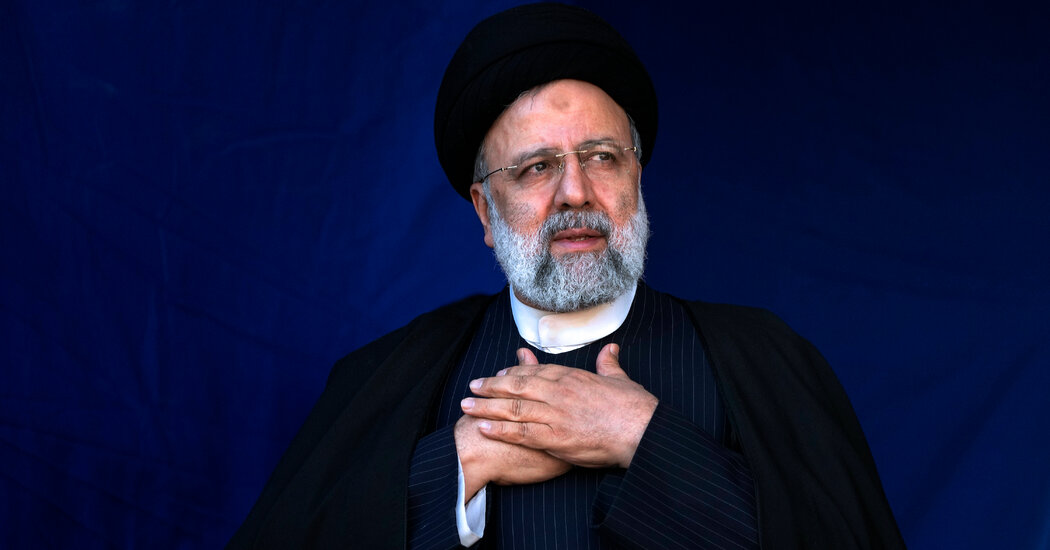A helicopter carrying Iranian President Ebrahim Raisi and his foreign minister crashed Sunday in the country's northwestern mountains, state media said, worsening the turbulence that has gripped the nation on both the international and domestic fronts in recent months.
Mr Raisi, 63, was traveling from Iran's border with Azerbaijan to inaugurate a joint dam project. The helicopter, carrying Raisi and Foreign Minister Hossein Amir Abdollahian, state media said, crashed near the town of Varzaghan around 1pm local time in bad weather and thick fog.
Search and rescue teams searched an area of high mountains and dense forests in rain and fog for more than 10 hours. At one point authorities called off the aerial search due to bad weather, sending infantrymen, elite Revolutionary Guards commandos and 40 rescue teams to locate the crash site.
Even late at night, state media had yet to report any news on the victims, or on the condition of the president or anyone else on board. The cause of the accident was also unknown.
“There will be no interruptions in the country's operations,” Supreme Leader Ayatollah Ali Khamenei said in a speech on state TV. “Senior officials are doing their work and I have advised them on the necessary points and all operations of the country will continue smoothly and in an orderly manner.”
Raisi, a conservative who has violently cracked down on dissent, is widely seen as a possible successor to the supreme leader. The uncertainty over his fate comes at a particularly tumultuous time for Iran.
Its long-running shadow war with Israel burst into the open after Hamas attacked Israel on October 7, sparking war in Gaza and a cascade of attacks and counterattacks across the region.
Hostilities became even more pronounced after Israel conducted airstrikes on a building in the Iranian embassy compound in Syria in April. Iran retaliated with its first direct attack on Israel after decades of enmity, launching more than 300 drones and missiles at the country, many of which were shot down.
Domestically, Iran is also facing widespread anger, with many residents calling for an end to clerical rule. Corruption and sanctions have destroyed the economy, fueling frustration.
Over the past two years, the country has witnessed an internal uprising, Iran's currency plummeting to an all-time low, water shortages intensified by climate change and the deadliest terrorist attack since the founding of the Islamic Republic in 1979.
If the president dies, the vice president takes over and elections must be held within 50 days, said Ali Vaez, Iran director of the International Crisis Group, an independent conflict prevention agency.
This, he said, would be “a major challenge for a country that is in the midst of a serious internal legitimacy crisis and dagger-pointing with Israel and the United States in the region.”
Raisi is a hardline cleric who came of age during the country's Islamic revolution. Under Iran's theocratic system, Raisi, as president, is the second most powerful individual in Iran's political structure after the supreme leader, Khamenei.
After becoming president in 2021, Raisi consolidated power and marginalized reformists who wanted to ease tensions with the West. He has repeatedly said he has pursued a policy of “strong diplomacy,” forging closer economic and security ties with Russia and China.
During Raisi's tenure, Iran continued to expand its regional influence, supporting proxies across the Middle East who conducted attacks against Israel and the United States, as well as advancing the country's nuclear program.
During the same period, Raisi oversaw a sweeping and deadly crackdown on domestic protesters, many of them women and young people, who had taken to the streets against the country's ruling clergy. Human rights groups said hundreds of protesters had been killed by the nation's security forces.
Raisi was seen as one of the candidates to succeed Khamenei as supreme leader. One of his main rivals for that role is Khamenei's son.
Despite the collapse, some analysts said they did not expect a significant change in Iran's agenda abroad.
The nation's supreme leader is responsible for setting all of the country's policies, analysts say, while the president's power comes from implementing those decisions.
“On the one hand, the outcome does not portend a sea change in how Iran formulates and acts on its interests abroad,” said Ali Vaez, Iran director of the International Crisis Group.
“It is the supreme leader who makes strategic decisions on foreign policy, albeit informed by the views of other key stakeholders, including the president.”
Abdollahian, the foreign minister, has been heavily involved in regional diplomacy with Arab countries. In recent months he had also met in Qatar with the leaders of militant groups supported by Iran, including the Palestinian Islamic Jihad and Hamas, the group that led the October 7 attack on Israel.
He was also engaged in indirect secret talks with the United States in Oman in February and May to discuss easing tensions and easing sanctions related to Iran's nuclear program.
Viviana Nereim contributed to the reporting.





